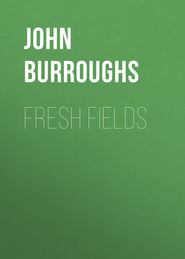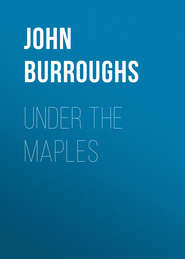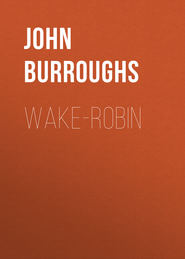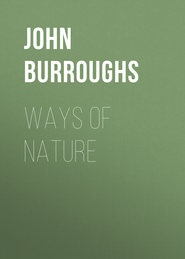По всем вопросам обращайтесь на: info@litportal.ru
(©) 2003-2024.
✖
Bird Stories from Burroughs
Настройки чтения
Размер шрифта
Высота строк
Поля
Unlike most of his kinsmen, the golden-wing prefers the fields and the borders of the forest to the deeper seclusion of the woods, and hence, contrary to the habit of his tribe, obtains most of his subsistence from the ground, probing it for ants and crickets. He is not quite satisfied with being a woodpecker. He courts the society of the robin and the finches, abandons the trees for the meadow, and feeds eagerly upon berries and grain. What may be the final upshot of this course of living is a question worthy the attention of Darwin. Will his taking to the ground and his pedestrian feats result in lengthening his legs, his feeding upon berries and grains subdue his tints and soften his voice, and his associating with Robin put a song into his heart?
In the cavity of an apple-tree, much nearer the house than they usually build, a pair of high-holes took up their abode. A knot-hole which led to the decayed interior was enlarged, the live wood being cut away as clean as a squirrel would have done it. The inside preparations I could not witness, but day after day, as I passed near, I heard the bird hammering away, evidently beating down obstructions and shaping and enlarging the cavity. The chips were not brought out, but were used rather to floor the interior. The woodpeckers are not nest-builders, but rather nest-carvers.
The time seemed very short before the voices of the young were heard in the heart of the old tree, – at first feebly, but waxing stronger day by day until they could be heard many rods distant. When I put my hand upon the trunk of the tree, they would set up an eager, expectant chattering; but if I climbed up it toward the opening, they soon detected the unusual sound and would hush quickly, only now and then uttering a warning note. Long before they were fully fledged they clambered up to the orifice to receive their food. As but one could stand in the opening at a time, there was a good deal of elbowing and struggling for this position. It was a very desirable one aside from the advantages it had when food was served; it looked out upon the great, shining world, into which the young birds seemed never tired of gazing. The fresh air must have been a consideration also, for the interior of a high-hole's dwelling is not sweet. When the parent birds came with food, the young one in the opening did not get it all, but after he had received a portion, either on his own motion or on a hint from the old one, he would give place to the one behind him. Still, one bird evidently outstripped his fellows, and in the race of life was two or three days in advance of them. His voice was loudest and his head oftenest at the window. But I noticed that, when he had kept the position too long, the others evidently made it uncomfortable in his rear, and, after "fidgeting" about awhile, he would be compelled to "back down." But retaliation was then easy, and I fear his mates spent few easy moments at that lookout. They would close their eyes and slide back into the cavity as if the world had suddenly lost all its charms for them.
This bird was, of course, the first to leave the nest. For two days before that event he kept his position in the opening most of the time and sent forth his strong voice incessantly. The old ones abstained from feeding him almost entirely, no doubt to encourage his exit. As I stood looking at him one afternoon and noting his progress, he suddenly reached a resolution, – seconded, I have no doubt, from the rear, – and launched forth upon his untried wings. They served him well, and carried him about fifty yards up-hill the first heat. The second day after, the next in size and spirit left in the same manner; then another, till only one remained. The parent birds ceased their visits to him, and for one day he called and called till our ears were tired of the sound. His was the faintest heart of all. Then he had none to encourage him from behind. He left the nest and clung to the outer bole of the tree, and yelped and piped for an hour longer; then he committed himself to his wings and went his way like the rest.
The matchmaking of the high-holes, which often comes under my observation, is in marked contrast to that of the robins and the bluebirds. There does not appear to be any anger or any blows. The male or two males will alight on a limb in front of the female, and go through with a series of bowings and scrapings that are truly comical. He spreads his tail, he puffs out his breast, he throws back his head and then bends his body to the right and to the left, uttering all the while a curious musical hiccough. The female confronts him unmoved, but whether her attitude is critical or defensive, I cannot tell. Presently she flies away, followed by her suitor or suitors, and the little comedy is enacted on another stump or tree. Among all the woodpeckers the drum plays an important part in the matchmaking. The male takes up his stand on a dry, resonant limb, or on the ridgeboard of a building, and beats the loudest call he is capable of. A favorite drum of the high-holes about me is a hollow wooden tube, a section of a pump, which stands as a bird-box upon my summer-house. It is a good instrument; its tone is sharp and clear. A high-hole alights upon it, and sends forth a rattle that can be heard a long way off. Then he lifts up his head and utters that long April call, Wick, wick, wick, wick. Then he drums again. If the female does not find him, it is not because he does not make noise enough. But his sounds are all welcome to the ear. They are simple and primitive, and voice well a certain sentiment of the April days. As I write these lines I hear through the half-open door his call come up from a distant field. Then I hear the steady hammering of one that has been for three days trying to penetrate the weather boarding of the big icehouse by the river, and to reach the sawdust filling for a nesting-place.
THE PHŒBE
Another April bird whose memory I fondly cherish is the phœbe-bird, the pioneer of the flycatchers. In the inland farming districts, I used to notice him, on some bright morning about Easter Day, proclaiming his arrival, with much variety of motion and attitude, from the peak of the barn or hay-shed. As yet, you may have heard only the plaintive, homesick note of the bluebird, or the faint trill of the song sparrow; and the phœbe's clear, vivacious assurance of his veritable bodily presence among us again is welcomed by all ears. At agreeable intervals in his lay he describes a circle or an ellipse in the air, ostensibly prospecting for insects, but really, I suspect, as an artistic flourish, thrown in to make up in some way for the deficiency of his musical performance. If plainness of dress indicates powers of song, as it usually does, the phœbe ought to be unrivaled in musical ability, for surely that ashen-gray suit is the superlative of plainness; and that form, likewise, would hardly pass for a "perfect figure" of a bird. The seasonableness of his coming, however, and his civil, neighborly ways, shall make up for all deficiencies in song and plumage.
The phœbe-bird is a wise architect and perhaps enjoys as great an immunity from danger, both in its person and its nest, as any other bird. Its modest ashen-gray suit is the color of the rocks where it builds, and the moss of which it makes such free use gives to its nest the look of a natural growth or accretion. But when it comes into the barn or under the shed to build, as it so frequently does, the moss is rather out of place. Doubtless in time the bird will take the hint, and when she builds in such places will leave the moss out. I noted but two nests the summer I am speaking of: one in a barn failed of issue, on account of the rats, I suspect, though the little owl may have been the depredator; the other, in the woods, sent forth three young. This latter nest was most charmingly and ingeniously placed. I discovered it while in quest of pond-lilies, in a long, deep, level stretch of water in the woods. A large tree had blown over at the edge of the water, and its dense mass of upturned roots, with the black, peaty soil filling the interstices, was like the fragment of a wall several feet high, rising from the edge of the languid current. In a niche in this earthy wall, and visible and accessible only from the water, a phœbe had built her nest and reared her brood. I paddled my boat up and came alongside prepared to take the family aboard. The young, nearly ready to fly, were quite undisturbed by my presence, having probably been assured that no danger need be apprehended from that side. It was not a likely place for minks, or they would not have been so secure.
THE COMING OF PHŒBE
When buckets shine 'gainst maple trees
And drop by drop the sap doth flow,
When days are warm, but still nights freeze,
And deep in woods lie drifts of snow,
When cattle low and fret in stall,
Then morning brings the phœbe's call,
"Phœbe,
Phœbe, phœbe," a cheery note,
While cackling hens make such a rout.
When snowbanks run, and hills are bare,
And early bees hum round the hive,
When woodchucks creep from out their lair
Right glad to find themselves alive,
When sheep go nibbling through the fields,
Then Phœbe oft her name reveals,
"Phœbe,
Phœbe, phœbe," a plaintive cry,
While jack-snipes call in morning sky.
When wild ducks quack in creek and pond
And bluebirds perch on mullein-stalks,
When spring has burst her icy bond
And in brown fields the sleek crow walks,
When chipmunks court in roadside walls,
Then Phœbe from the ridgeboard calls,
"Phœbe,
Phœbe, phœbe," and lifts her cap,
While smoking Dick doth boil the sap.
THE COWBIRD
The cow blackbird is a noticeable songster in April, though it takes a back seat a little later. It utters a peculiarly liquid April sound. Indeed, one would think its crop was full of water, its notes so bubble up and regurgitate, and are delivered with such an apparent stomachic contraction. This bird is the only feathered polygamist we have. The females are greatly in excess of the males, and the latter are usually attended by three or four of the former. As soon as the other birds begin to build, they are on the qui vive, prowling about like gypsies, not to steal the young of others, but to steal their eggs into other birds' nests, and so shirk the labor and responsibility of hatching and rearing their own young.
The cowbird's tactics are probably to watch the movements of the parent bird. She may often be seen searching anxiously through the trees or bushes for a suitable nest, yet she may still oftener be seen perched upon some good point of observation watching the birds as they come and go about her. There is no doubt that, in many cases, the cowbird makes room for her own illegitimate egg in the nest by removing one of the bird's own. I found a sparrow's nest with two sparrow's eggs and one cowbird's egg, and another egg lying a foot or so below it on the ground. I replaced the ejected egg, and the next day found it again removed, and another cowbird's egg in its place. I put it back the second time, when it was again ejected, or destroyed, for I failed to find it anywhere. Very alert and sensitive birds, like the warblers, often bury the strange egg beneath a second nest built on top of the old. A lady living in the suburbs of an Eastern city heard cries of distress one morning from a pair of house wrens that had a nest in a honeysuckle on her front porch. On looking out of the window, she beheld this little comedy, – comedy from her point of view, but no doubt grim tragedy from the point of view of the wrens: a cowbird with a wren's egg in its beak running rapidly along the walk, with the outraged wrens forming a procession behind it, screaming, scolding, and gesticulating as only these voluble little birds can. The cowbird had probably been surprised in the act of violating the nest, and the wrens were giving her a piece of their minds.
Every cowbird is reared at the expense of two or more song-birds. For every one of these dusky little pedestrians there amid the grazing cattle there are two or more sparrows, or vireos, or warblers, the less. It is a big price to pay, – two larks for a bunting, – two sovereigns for a shilling; but Nature does not hesitate occasionally to contradict herself in just this way. The young of the cowbird is disproportionately large and aggressive, one might say hoggish. When disturbed, it will clasp the nest and scream and snap its beak threateningly. One was hatched out in a song sparrow's nest which was under my observation, and would soon have overridden and overborne the young sparrow which came out of the shell a few hours later, had I not interfered from time to time and lent the young sparrow a helping hand. Every day I would visit the nest and take the sparrow out from under the potbellied interloper, and place it on top, so that presently it was able to hold its own against its enemy. Both birds became fledged and left the nest about the same time. Whether the race was an even one after that, I know not.
THE CHIPPING SPARROW
When the true flycatcher catches a fly, it is quick business. There is no strife, no pursuit, – one fell swoop, and the matter is ended. Now note that yonder little sparrow is less skilled. It is the chippy, and he finds his subsistence properly in various seeds and the larvæ of insects, though he occasionally has higher aspirations, and seeks to emulate the pewee, commencing and ending his career as a flycatcher by an awkward chase after a beetle or "miller." He is hunting around in the grass now, I suspect, with the desire to indulge this favorite whim. There! – the opportunity is afforded him. Away goes a little cream-colored meadow-moth in the most tortuous course he is capable of, and away goes Chippy in pursuit. The contest is quite comical, though I dare say it is serious enough to the moth. The chase continues for a few yards, when there is a sudden rushing to cover in the grass, – then a taking to wing again, when the search has become too close, and the moth has recovered his wind. Chippy chirps angrily, and is determined not to be beaten. Keeping, with the slightest effort, upon the heels of the fugitive, he is ever on the point of halting to snap him up, but never quite does it; and so, between disappointment and expectation, is soon disgusted, and returns to pursue his more legitimate means of subsistence.
Last summer I made this record in my notebook: "A nest of young robins in the maple in front of the house being fed by a chipping sparrow. The little sparrow is very attentive; seems decidedly fond of her adopted babies. The old robins resent her services, and hustle her out of the tree whenever they find her near the nest. (It was this hurried departure of Chippy from the tree that first attracted my attention.) She watches her chances, and comes with food in their absence. The young birds are about ready to fly, and when the chippy feeds them her head fairly disappears in their capacious mouths. She jerks it back as if she were afraid of being swallowed. Then she lingers near them on the edge of the nest, and seems to admire them. When she sees the old robin coming, she spreads her wings in an attitude of defense, and then flies away. I wonder if she has had the experience of rearing a cow-bunting?" (A day later.) "The robins are out of the nest, and the little sparrow continues to feed them. She approaches them rather timidly and hesitatingly, as if she feared they might swallow her, then thrusts her titbit quickly into the distended mouth and jerks back."
Whether the chippy had lost her own brood, whether she was an unmated bird, or whether the case was simply the overflowing of the maternal instinct, it would be interesting to know.
THE CHEWINK
The chewink is a shy bird, but not stealthy. It is very inquisitive, and sets up a great scratching among the leaves, apparently to attract your attention. The male is perhaps the most conspicuously marked of all the ground-birds except the bobolink, being black above, bay on the sides, and white beneath. The bay is in compliment to the leaves he is forever scratching among, – they have rustled against his breast and sides so long that these parts have taken their color; but whence come the white and the black? The bird seems to be aware that his color betrays him, for there are few birds in the woods so careful about keeping themselves screened from view. When in song, its favorite perch is the top of some high bush near to cover. On being disturbed at such times, it pitches down into the brush and is instantly lost to view.
This is the bird that Thomas Jefferson wrote to Wilson about, greatly exciting the latter's curiosity. Wilson was just then upon the threshold of his career as an ornithologist, and had made a drawing of the Canada jay which he sent to the President. It was a new bird, and in reply Jefferson called his attention to a "curious bird" which was everywhere to be heard, but scarcely ever to be seen. He had for twenty years interested the young sportsmen of his neighborhood to shoot one for him, but without success. "It is in all the forests, from spring to fall," he says in his letter, "and never but on the tops of the tallest trees, from which it perpetually serenades us with some of the sweetest notes, and as clear as those of the nightingale. I have followed it for miles, without ever but once getting a good view of it. It is of the size and make of the mockingbird, lightly thrush-colored on the back, and a grayish-white on the breast and belly. Mr. Randolph, my son-in-law, was in possession of one which had been shot by a neighbor," etc. Randolph pronounced it a flycatcher, which was a good way wide of the mark. Jefferson must have seen only the female, after all his tramp, from his description of the color; but he was doubtless following his own great thoughts more than the bird, else he would have had an earlier view. The bird was not a new one, but was well known then as the ground-robin. The President put Wilson on the wrong scent by his erroneous description, and it was a long time before the latter got at the truth of the case. But Jefferson's letter is a good sample of those which specialists often receive from intelligent persons who have seen or heard something in their line very curious or entirely new, and who set the man of science agog by a description of the supposed novelty, – a description that generally fits the facts of the case about as well as your coat fits the chair-back. Strange and curious things in the air, and in the water, and in the earth beneath, are seen every day except by those who are looking for them, namely, the naturalists. When Wilson or Audubon gets his eye on the unknown bird, the illusion vanishes, and your phenomenon turns out to be one of the commonplaces of the fields or woods.
THE BROWN THRASHER
Our long-tailed thrush, or thrasher, delights in a high branch of some solitary tree, whence it will pour out its rich and intricate warble for an hour together. This bird is the great American chipper. There is no other bird that I know of that can chip with such emphasis and military decision as this yellow-eyed songster. It is like the click of a giant gunlock. Why is the thrasher so stealthy? It always seems to be going about on tip-toe. I never knew it to steal anything, and yet it skulks and hides like a fugitive from justice. One never sees it flying aloft in the air and traversing the world openly, like most birds, but it darts along fences and through bushes as if pursued by a guilty conscience. Only when the musical fit is upon it does it come up into full view, and invite the world to hear and behold.
Years pass without my finding a brown thrasher's nest; it is not a nest you are likely to stumble upon in your walk; it is hidden as a miser hides his gold, and watched as jealously. The male pours out his rich and triumphant song from the tallest tree he can find, and fairly challenges you to come and look for his treasures in his vicinity. But you will not find them if you go. The nest is somewhere on the outer circle of his song; he is never so imprudent as to take up his stand very near it. The artists who draw those cozy little pictures of a brooding mother bird, with the male perched but a yard away in full song, do not copy from nature. The thrasher's nest I found was thirty or forty rods from the point where the male was wont to indulge in his brilliant recitative. It was in an open field under a low ground-juniper. My dog disturbed the sitting bird as I was passing near. The nest could be seen only by lifting up and parting away the branches. All the arts of concealment had been carefully studied. It was the last place you would think of looking in, and, if you did look, nothing was visible but the dense green circle of the low-spreading juniper. When you approached, the bird would keep her place till you had begun to stir the branches, when she would start out, and, just skimming the ground, make a bright brown line to the near fence and bushes. I confidently expected that this nest would escape molestation, but it did not. Its discovery by myself and dog probably opened the door for ill luck, as one day, not long afterward, when I peeped in upon it, it was empty. The proud song of the male had ceased from his accustomed tree, and the pair were seen no more in that vicinity.
After a pair of nesting birds have been broken up once or twice during the season, they become almost desperate, and will make great efforts to outwit their enemies. A pair of brown thrashers built their nest in a pasture-field under a low, scrubby apple-tree which the cattle had browsed down till it spread a thick, wide mass of thorny twigs only a few inches above the ground. Some blackberry briers had also grown there, so that the screen was perfect. My dog first started the bird, as I was passing near. By stooping low and peering intently, I could make out the nest and eggs. Two or three times a week, as I passed by, I would pause to see how the nest was prospering. The mother bird would keep her place, her yellow eyes never blinking. One morning, as I looked into her tent, I found the nest empty. Some night-prowler, probably a skunk or a fox, or maybe a black snake or a red squirrel by day, had plundered it. It would seem as if it was too well screened; it was in such a spot as any depredator would be apt to explore. "Surely," he would say, "this is a likely place for a nest." The birds then moved over the hill a hundred rods or more, much nearer the house, and in some rather open bushes tried again. But again they came to grief. Then, after some delay, the mother bird made a bold stroke. She seemed to reason with herself thus: "Since I have fared so disastrously in seeking seclusion for my nest, I will now adopt the opposite tactics, and come out fairly in the open. What hides me hides my enemies: let us try greater publicity." So she came out and built her nest by a few small shoots that grew beside the path that divides the two vineyards, and where we passed to and fro many times daily. I discovered her by chance early in the morning as I proceeded to my work. She started up at my feet and flitted quickly along above the ploughed ground, almost as red as the soil. I admired her audacity. Surely no prowler by night or day would suspect a nest in this open and exposed place. There was no cover by which they could approach, and no concealment anywhere. The nest was a hasty affair, as if the birds' patience at nest-building had been about exhausted. Presently an egg appeared, and then the next day another, and on the fourth day a third. No doubt the bird would have succeeded this time had not man interfered. In cultivating the vineyards the horse and cultivator had to pass over this very spot. Upon this the bird had not calculated. I determined to assist her. I called my man, and told him there was one spot in that vineyard, no bigger than his hand, where the horse's foot must not be allowed to fall, nor tooth of cultivator to touch. Then I showed him the nest, and charged him to avoid it. Probably if I had kept the secret to myself, and let the bird run her own risk, the nest would have escaped. But the result was that the man, in elaborately trying to avoid the nest, overdid the matter; the horse plunged, and set his foot squarely upon it. Such a little spot, the chances were few that the horse's foot would fall exactly there; and yet it did, and the birds' hopes were again dashed. The pair then disappeared from my vicinity, and I saw them no more.
THE HOUSE WREN
A few years ago I put up a little bird-house in the back end of my garden for the accommodation of the wrens, and every season a pair have taken up their abode there. One spring a pair of bluebirds looked into the tenement and lingered about several days, leading me to hope that they would conclude to occupy it. But they finally went away, and later in the season the wrens appeared, and, after a little coquetting, were regularly installed in their old quarters, and were as happy as only wrens can be.
One of our younger poets, Myron Benton, saw a little bird which must have been the wren, as I know of no other bird that so throbs and palpitates with music as this little vagabond. And the pair I speak of seemed exceptionally happy, and the male had a small tornado of song in his crop that kept him "ruffled" every moment in the day. But before their honeymoon was over the bluebirds returned. I knew something was wrong before I was up in the morning. Instead of that voluble and gushing song outside the window, I heard the wrens scolding and crying at a fearful rate, and on going out saw the bluebirds in possession of the box. The poor wrens were in despair; they wrung their hands and tore their hair, after the wren fashion, but chiefly did they rattle out their disgust and wrath at the intruders. I have no doubt that, if it could have been interpreted, it would have been proven the rankest and most voluble billingsgate ever uttered. For the wren is saucy, and he has a tongue in his head that can outwag any other tongue known to me.
"Ruffled with whirlwind of his ecstasies,"
The bluebirds said nothing, but the male kept an eye on Mr. Wren, and, when he came too near, gave chase, driving him to cover under the fence, or under a rubbish-heap or other object, where the wren would scold and rattle away, while his pursuer sat on the fence or the pea-brush waiting for him to reappear.
Days passed, and the usurpers prospered and the outcasts were wretched; but the latter lingered about, watching and abusing their enemies, and hoping, no doubt, that things would take a turn, as they presently did. The outraged wrens were fully avenged. The mother bluebird had laid her full complement of eggs and was beginning to set, when one day, as her mate was perched above her on the barn, along came a boy with one of those wicked elastic slings and cut him down with a pebble. There he lay like a bit of sky fallen upon the grass. The widowed bird seemed to understand what had happened, and without much ado disappeared next day in quest of another mate.
In the mean time the wrens were beside themselves with delight; they fairly screamed with joy. If the male was before "ruffled with whirlwind of his ecstasies," he was now in danger of being rent asunder. He inflated his throat and caroled as wren never caroled before. And the female, too, how she cackled and darted about! How busy they both were! Rushing into the nest, they hustled those eggs out in less than a minute, wren time. They carried in new material, and by the third day were fairly installed again in their old quarters; but on the third day, so rapidly are these little dramas played, the female bluebird reappeared with another mate. Ah! how the wren stock went down then! What dismay and despair filled again those little breasts! It was pitiful. They did not scold as before, but after a day or two withdrew from the garden, dumb with grief, and gave up the struggle.
The chatter of a second brood of nearly fledged wrens is heard now (August 20) in an oriole's nest suspended from the branch of an apple-tree near where I write. Earlier in the season the parent birds made long and determined attempts to establish themselves in a cavity that had been occupied by a pair of bluebirds. The original proprietor of the place was the downy woodpecker. He had excavated it the autumn before, and had passed the winter there, often to my certain knowledge lying abed till nine o'clock in the morning. In the spring he went elsewhere, probably with a female, to begin the season in new quarters. The bluebirds early took possession, and in June their first brood had flown. The wrens had been hanging around, evidently with an eye on the place (such little comedies may be witnessed anywhere), and now very naturally thought it was their turn. A day or two after the young bluebirds had flown, I noticed some fine, dry grass clinging to the entrance to the cavity; a circumstance which I understood a few moments later, when the wren rushed by me into the cover of a small Norway spruce, hotly pursued by the male bluebird. It was a brown streak and a blue streak pretty close together. The wrens had gone to housecleaning, and the bluebird had returned to find his bed and bedding being pitched out of doors, and had thereupon given the wrens to understand in the most emphatic manner that he had no intention of vacating the premises so early in the season. Day after day, for more than two weeks, the male bluebird had to clear his premises of these intruders. It occupied much of his time and not a little of mine, as I sat with a book in a summer-house near by, laughing at his pretty fury and spiteful onset. On two occasions the wren rushed under the chair in which I sat, and a streak of blue lightning almost flashed in my very face. One day, just as I had passed the tree in which the cavity was located, I heard the wren scream desperately; turning, I saw the little vagabond fall into the grass with the wrathful bluebird fairly upon him; the latter had returned just in time to catch him, and was evidently bent on punishing him well. But in the squabble in the grass the wren escaped and took refuge in the friendly evergreen. The bluebird paused for a moment with outstretched wings looking for the fugitive, then flew away. A score of times during the month of June did I see the wren taxing every energy to get away from the bluebird. He would dart into the stone wall, under the floor of the summer-house, into the weeds, – anywhere to hide his diminished head. The bluebird, with his bright coat, looked like an officer in uniform in pursuit of some wicked, rusty little street gamin. Generally the favorite house of refuge of the wrens was the little spruce, into which their pursuer made no attempt to follow them. The female would sit concealed amid the branches, chattering in a scolding, fretful way, while the male with his eye upon his tormentor would perch on the topmost shoot and sing. Why he sang at such times, whether in triumph and derision, or to keep his courage up and reassure his mate, I could not make out. When his song was suddenly cut short, and I glanced to see him dart down into the spruce, my eye usually caught a twinkle of blue wings hovering near. The wrens finally gave up the fight, and their enemies reared their second brood in peace.
THE SONG SPARROW
The first song sparrow's nest I observed in the spring of 1881 was in a field under a fragment of a board, the board being raised from the ground a couple of inches by two poles. It had its full complement of eggs, and probably sent forth a brood of young birds, though as to this I cannot speak positively, as I neglected to observe it further. It was well sheltered and concealed, and was not easily come at by any of its natural enemies, save snakes and weasels. But concealment often avails little. In May, a song sparrow, which had evidently met with disaster earlier in the season, built its nest in a thick mass of woodbine against the side of my house, about fifteen feet from the ground. Perhaps it took the hint from its cousin the English sparrow. The nest was admirably placed, protected from the storms by the overhanging eaves and from all eyes by the thick screen of leaves. Only by patiently watching the suspicious bird, as she lingered near with food in her beak, did I discover its whereabouts. That brood is safe, I thought, beyond doubt. But it was not: the nest was pillaged one night, either by an owl, or else by a rat that had climbed into the vine, seeking an entrance to the house. The mother bird, after reflecting upon her ill luck about a week, seemed to resolve to try a different system of tactics, and to throw all appearances of concealment aside. She built a nest a few yards from the house, beside the drive, upon a smooth piece of greensward. There was not a weed or a shrub or anything whatever to conceal it or mark its site. The structure was completed, and incubation had begun, before I discovered what was going on. "Well, well," I said, looking down upon the bird almost at my feet, "this is going to the other extreme indeed; now the cats will have you." The desperate little bird sat there day after day, looking like a brown leaf pressed down in the short green grass. As the weather grew hot, her position became very trying. It was no longer a question of keeping the eggs warm, but of keeping them from roasting. The sun had no mercy on her, and she fairly panted in the middle of the day. In such an emergency the male robin has been known to perch above the sitting female and shade her with his outstretched wings. But in this case there was no perch for the male bird, had he been disposed to make a sunshade of himself. I thought to lend a hand in this direction myself, and so stuck a leafy twig beside the nest. This was probably an unwise interference: it guided disaster to the spot; the nest was broken up, and the mother bird was probably caught, as I never saw her afterward.
One day a tragedy was enacted a few yards from where I was sitting with a book: two song sparrows were trying to defend their nest against a black snake. The curious, interrogating note of a chicken who had suddenly come upon the scene in his walk first caused me to look up from my reading. There were the sparrows, with wings raised in a way peculiarly expressive of horror and dismay, rushing about a low clump of grass and bushes. Then, looking more closely, I saw the glistening form of the black snake, and the quick movement of his head as he tried to seize the birds. The sparrows darted about and through the grass and weeds, trying to beat the snake off. Their tails and wings were spread, and, panting with the heat and the desperate struggle, they presented a most singular spectacle. They uttered no cry, not a sound escaped them; they were plainly speechless with horror and dismay. Not once did they drop their wings, and the peculiar expression of those uplifted palms, as it were, I shall never forget. It occurred to me that perhaps here was a case of attempted bird-charming on the part of the snake, so I looked on from behind the fence. The birds charged the snake and harassed him from every side, but were evidently under no spell save that of courage in defending their nest. Every moment or two I could see the head and neck of the serpent make a sweep at the birds, when the one struck at would fall back, and the other would renew the assault from the rear. There appeared to be little danger that the snake could strike and hold one of the birds, though I trembled for them, they were so bold and approached so near to the snake's head. Time and again he sprang at them, but without success. How the poor things panted, and held up their wings appealingly! Then the snake glided off to the near fence, barely escaping the stone which I hurled at him. I found the nest rifled and deranged; whether it had contained eggs or young, I know not. The male sparrow had cheered me many a day with his song, and I blamed myself for not having rushed at once to the rescue, when the arch enemy was upon him. There is probably little truth in the popular notion that snakes charm birds. The black snake is the most subtle, alert, and devilish of our snakes, and I have never seen him have any but young, helpless birds in his mouth.











